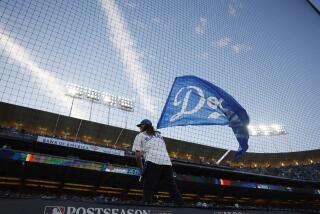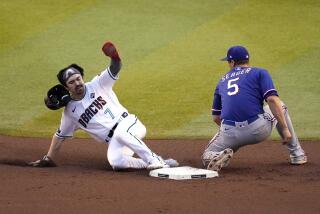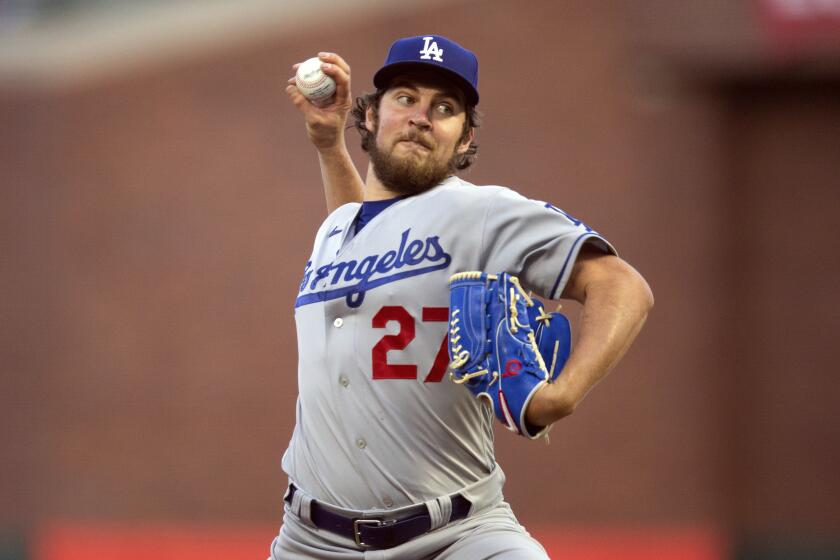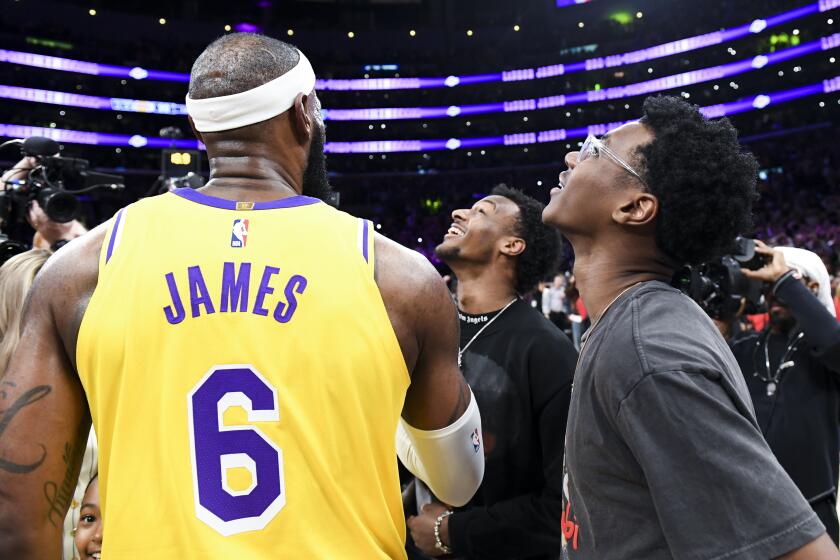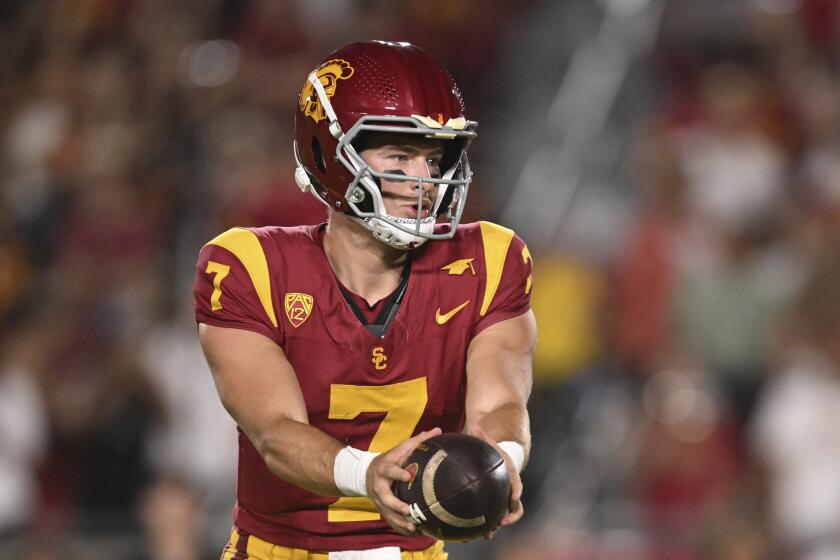Baseball’s unwritten rules go unspoken
Reporting from Detroit — Between innings of his no-hitter Wednesday in Cleveland, Ervin Santana rested in the Angels’ dugout next to an orange Gatorade cooler.
The Baseball Gods long ago decreed that a pitcher in the midst of a no-hitter is not to be disturbed by idle chatter that might disrupt his concentration or upset his mojo. But it was 81 degrees and humid, and with Santana sitting next to the Gatorade cooler his thirsty teammates had to say something when they went by.
“We were talking to him in the dugout throughout the game,” second baseman Howie Kendrick said. “We didn’t mention what was going on because it’s kind of one of those unwritten rules. But we tried to have fun.”
Up in the TV booth, though, Angels broadcaster Victor Rojas was unwilling to tempt the Gods so he refused to talk about the no-hitter.
“It’s just kind of the way I grew up,” Rojas, whose father Cookie was a five-time All-Star infielder, said Friday. “It’s just one of the things you don’t talk about.
“I’m superstitious. I’ll always be that, especially when it comes to baseball.”
Baseball has long been guided by such superstition. It’s why even players with Ivy League educations won’t change their underwear when they’re on a hot streak or avoid stepping on the baselines when they take the field.
And those are only a few of baseball’s unwritten rules — informal but widely agreed-upon guidelines that dictate how the game should be played.
The first unwritten rule?
“Thou shalt not speak of the unwritten rules,” said Michael Duca, an official scorer in the San Francisco Bay Area and coauthor of “The Baseball Codes: Beanballs, Sign Stealing and Bench-Clearing Brawls: The Unwritten Rules of America’s Pastime.”
But written or not, there are certain basic elements of baseball etiquette that everyone agrees on, and not talking during a no-hitter is only one of them.
Don’t hurt, embarrass or show up the other team, for example. Never disrespect the game. And if you hit one of our guys, we’ll hit one of yours.
“That’s the way it is,” the Angels’ Torii Hunter said. “I prefer that. You take care of it on the field and it’s over.”
Exactly what you’re taking care of on the field and when it’s over can be open to interpretation, though. One unwritten rule is never steal a base when your team has a big lead late in a game.
How big a lead and how late in the game? Well, no one knows.
“One thing that I’ve learned is everyone has a different viewpoint,” Dodgers pitcher Ted Lilly said. “Individuals have their opinions as to where that line is. It’s a gray area.”
Yet when that line is crossed there’s a favored response. A painful one.
“That’s when you try to pitch inside. And sometimes that ball gets away,” said Mark Gubicza, a two-time All-Star pitcher with the Kansas City Royals and Rojas’ partner on Angels broadcasts. “You have to protect your teammates at all costs because … you [could] lose respect.
“It’s basically all different forms of the word respect. You’ve got to respect your opponent. Don’t show them up. Respect the game itself. And if a guy’s hit by a pitch and you pretty much think it was on purpose, then to keep the respect of your teammates you have to do something back to them.”
That eye-for-an-eye policy also extends to who should get hit, especially in the American League, where offending pitchers don’t bat.
“We know who’s going to get hit,” Hunter said. “If the four-hole hitter, the big money on the team, if he gets hit, we’re going to hit your big-money guy. If it’s the little second baseman that gets hit and hit on purpose, we’re going to hit your little second baseman.”
Dodgers Manager Don Mattingly says some umpires who don’t understand the code are too quick to censure pitchers for throwing inside, denying the other team a chance to even the score and causing tensions to linger. Mattingly pointed to an episode last July in which both benches were warned after San Francisco’s Tim Lincecum, locked in a duel with the Dodgers’ Clayton Kershaw, hit slugger Matt Kemp.
“So Lincecum gets a free shot,” Mattingly said. “Kershaw wants to protect his players, but if he protects his player he gets thrown out.
“The old way is, you let that go. Kershaw goes out, [hits a Giant], OK, that’s it. You did it right. You got hit here, you got hit there.”
Some old-school managers, such as Tony La Russa of the St. Louis Cardinals, Jim Leyland of the Detroit Tigers and Kirk Gibson of the Arizona Diamondbacks, are sticklers for the code, and their veteran players enforce it. On other teams, rookies have to figure things out for themselves.
“They don’t, like, sit you down,” said Hank Conger, a rookie catcher with the Angels before recently being demoted to triple A. “If you watch baseball, you get a feel. You listen to what people say.”
In a subtle way, baseball’s unwritten rules extend beyond players and coaches to include bat boys, trainers, sportswriters and, of course, certain TV broadcasters. Not only is it bad form for those people to talk about a no-hitter while it is in progress, but they aren’t to speak with the starting pitcher in the hours before a game or remind players that they’re on a hot or cold streak.
And baseball’s unwritten rules are unwritten in languages other than English. When former big leaguer Hee-Seop Choi was suffering through a bad slump with the Marlins, the throng of Korean reporters sent to cover him didn’t speak with Choi for several days out of respect for the slump.
Then there is the long list of things rookies should and shouldn’t do. It’s a list that varies in both length and severity from team to team, but in the Angels clubhouse they’re known as the “Torii Rules” and they address everything from who gets to eat and shower first after games (hint: not the rookies) to who gets on the team bus and team plane last (hint: the rookies).
Or, as Conger put it, it’s all about “trying to be respectful of your standing, what you’re supposed to do.”
More to Read
Get our high school sports newsletter
Prep Rally is devoted to the SoCal high school sports experience, bringing you scores, stories and a behind-the-scenes look at what makes prep sports so popular.
You may occasionally receive promotional content from the Los Angeles Times.
